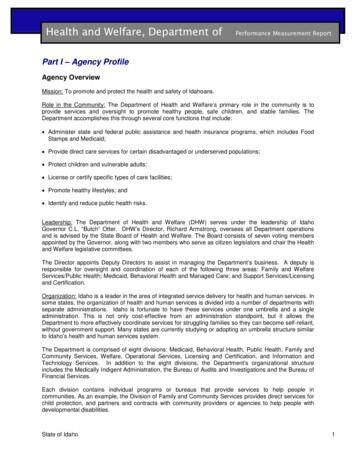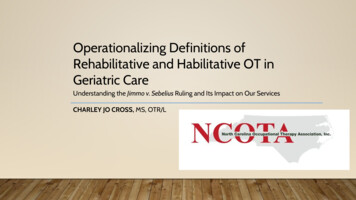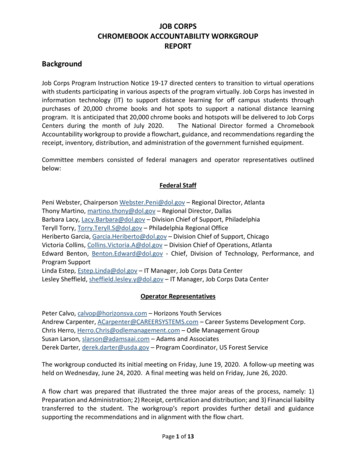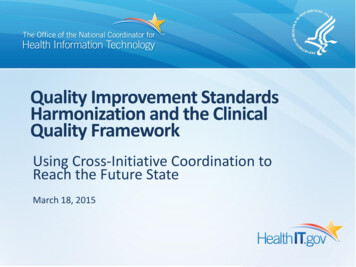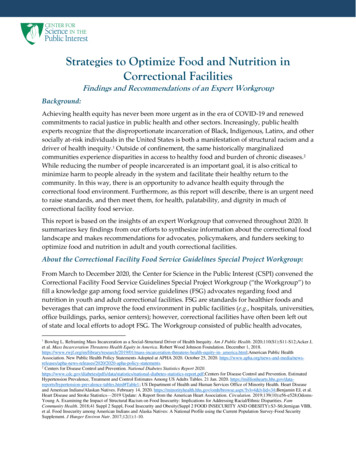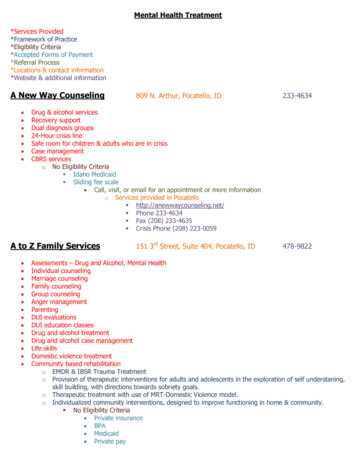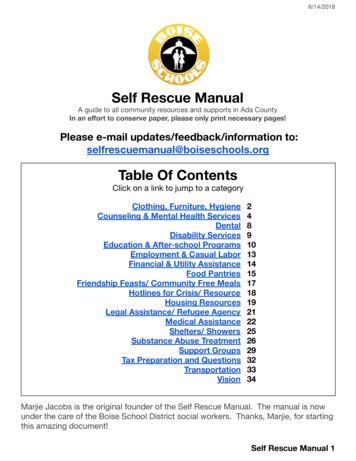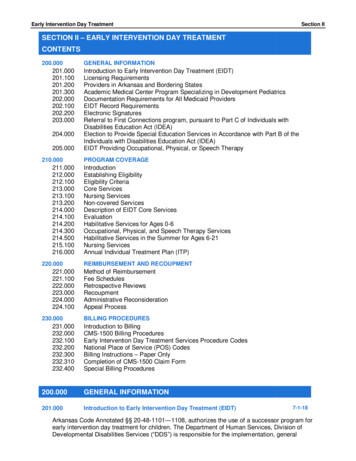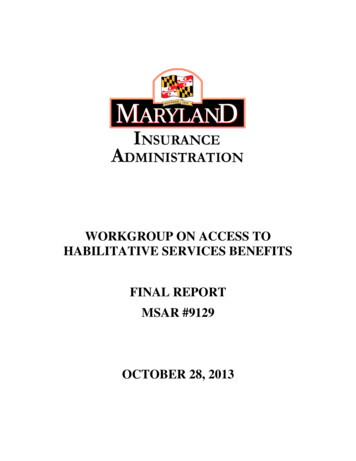
Transcription
WORKGROUP ON ACCESS TOHABILITATIVE SERVICES BENEFITSFINAL REPORTMSAR #9129OCTOBER 28, 2013
WORKGROUP ON ACCESS TO HABILITATIVE SERVICES BENEFITSMembership RosterMaryland State Senate MemberCo-ChairThe Honorable Senator Richard S. Madaleno, Jr.District 18, Montgomery CountyMaryland House of Delegates MemberCo-ChairThe Honorable Ariana B. KellyDistrict 16, Montgomery CountyMaryland Insurance CommissionerTherese M. GoldsmithRepresentative of the Maryland Health Care CommissionBruce KozlowskiRepresentative of the Maryland State Department of EducationSteven D. SorinRepresentative of the Maryland Developmental Disabilities CouncilRachel London, Esq.Representative of the Maryland Department of DisabilitiesRachael Faulkner, MSWRepresentative of the Department of Health and Mental HygieneDebbie Badawi, M.D.Physical TherapistGinny Paleg, DScPTOccupational TherapistLori Tolen, OTR/LSpeech-Language PathologistKimberly A. Bell, M.S., CCC-SLPPediatriciansRobert L. Blake, M.D.Abila Tazanu-Legall, M.D.K-12 EducatorNancy FitzGerald, M.S.i
Early Intervention EducatorBrian Morrison, Ph.D.A Parent of a Child with Special NeedsVacantRepresentatives of InsurersJoe Winn, AetnaDeborah R. Rivkin, Esq., CareFirst BlueCross BlueShieldBernard Lapine, Esq., Coventry Health Care of DelawareJoseph A. Vander Walde, M.D., Kaiser PermanenteEdward P. Koza, M.D., United HealthCareThe workgroup would like to acknowledge the contributions of former parent representativeKelli Nelson, former educator representative Thomas Stengel, and former insurer representativeBrenda Myrick, MSN, to the work of the workgroup.The findings and recommendations included in this report represent those of the majority of themembers of the workgroup. Not all members agreed with all of the workgroup’s findings andrecommendations.ii
StaffTinna Damaso Quigley, Esq.Director of Government RelationsMaryland Insurance AdministrationBrenda WilsonAssociate Commissioner, Life and HealthMaryland Insurance AdministrationNancy J. Egan, Esq.Assistant Director of Government RelationsMaryland Insurance Administrationiii
TABLE OF CONTENTSI.ESTABLISHMENT OF WORKGROUP ON ACCESS TO HABILITATIVE SERVICESII.BACKGROUND ON MARYLAND INSURANCE LAW AND THE HABILTATIVESERVICES BENEFITS MANDATEIII.FINDINGSA.Determine whether children who are entitled to and would benefit fromhabilitative services under health insurance policies or contracts or healthmaintenance organization contracts are actually receiving them.If the children are not receiving the habilitative services, the reasons why.1.2.Evidence from Parentsa.Open Forumb.MIA Complaint Datac.Maryland Parent Survey from Office for Genetics and People withSpecial Health Care NeedsEvidence from Providersa.b.IV.Survey of Pediatricians, Family Physicians, and Primary CareCliniciansSurvey of Allied Health Professionals3.Evidence from Carriers4.Data from Maryland State Department of EducationB.Determine any actions needed to promote optimum use of the habilitative servicesto maximize outcomes for children and reduce long-term costs to the educationand health care systems.C.Determine the costs and benefits associated with expanding habilitative servicescoverage to individuals under the age of 26 years.RECOMMENDATIONSiv
APPENDICES1. Chapters 293/2942. a. Survey for Pediatricians, Family Physicians, and Primary Care Cliniciansb. Survey for Allied Health Professionals3. Summary of Results of 2010 Parent Survey conducted by the Parents Place, Marylandand the Office for Genetics and People with Special Health Care Needs4. a. Parents’ Guide to Habilitative Servicesb. Questions to Ask Your Health Insurance Company or HMO about Your Child’s Accessto Habilitative Services Benefits.5. a. 2007 Annual Mandated Health Insurance Services Evaluationb. 2011 Annual Mandated Health Insurance Services Evaluationv
I.ESTABLISHMENT OF WORKGROUP ON ACCESS TO HABILITATIVESERVICES BENEFITSDuring the 2012 Regular Session, the Maryland General Assembly passed Senate Bill744/ House Bill 1055 (Chapters 293/294), which require, among other things, the MarylandInsurance Commissioner (Commissioner) to establish a workgroup on access to habilitativeservices benefits and report to the Senate Finance Committee and House Health and GovernmentOperations Committee on its findings and recommendations.1The workgroup’s charges are to determine: (1) whether children who are entitled to andwould benefit from habilitative services under health insurance policies or contracts or healthmaintenance organization contracts are actually receiving them; (2) if the children are notreceiving the habilitative services, the reasons why; (3) any actions needed to promote optimumuse of the habilitative services to maximize outcomes for children and reduce long-term costs tothe education and health care systems; and (4) the costs and benefits associated with expandinghabilitative services coverage to individuals under the age of 26 years.In June 2012, the Commissioner convened a workgroup consisting of a physical therapist,an occupational therapist, a speech-language pathologist, pediatricians, K-12 and earlyintervention educators, a parent of a child with special needs, representatives of insurers, theMaryland Insurance Administration (MIA), the Maryland Health Care Commission, theMaryland State Department of Education (MSDE), the Maryland Developmental DisabilitiesCouncil, the Maryland Department of Disabilities, and the Department of Health and MentalHygiene. Senator Richard Madaleno, appointed by the President of the Senate, and DelegateAriana Kelly, appointed by the Speaker of the House, served as co-chairs of the workgroup. Thehealth care provider and educator members of the workgroup were recruited from state agenciesor professional associations and the parent member was recommended by MIA staff. Theinsurers selected to be included in the workgroup were chosen based on market share and healthbenefit plan offerings in the State.2Since establishment of the workgroup in 2012, several changes in membership occurreddue to other personal or professional commitments. It should be noted that while the workgroupcompleted its work with one vacancy for a parent of a child with special needs, several othermembers of the workgroup are the parents of children with special needs.II.BACKGROUND ON MARYLAND HABILITATIVE SERVICES BENEFITSMANDATE AND MARYLAND INSURANCE LAWA.Habilitative Services Benefits MandateThe Maryland habilitative services mandated benefit was enacted by Chapter 92 of theActs of 2000 and was codified as § 15-835 of the Insurance Article, Annotated Code of1Copies of the chapter laws appear in Appendix 1.The insurers represented on the workgroup offer health insurance policies and health maintenance organizationcontracts in the individual, small group, and large group markets in the State. Some insurers also provide third partyadministrator services for self-funded plans.21
Maryland. The mandate applies to insurers, nonprofit health service plans, and healthmaintenance organizations (carriers). It requires carriers to provide coverage for habilitativeservices for a child under the age of 19. The term “habilitative services” is defined in the law tomean “services, including occupational therapy, physical therapy, and speech therapy, for thetreatment of a child with a congenital or genetic birth defect to enhance the child’s ability tofunction.” The term “congenital or genetic birth defect” is defined to mean “a defect existing ator from birth, including a hereditary defect.” Chapter 92 of the Acts of 2000 also required acarrier to provide an annual notice about habilitative services coverage to its insureds andenrollees.Since 2000, the laws regarding the habilitative services benefits mandate have beenamended twice. The first amendments, made in 2002, clarified the definition of “congenital orgenetic birth defect” to specifically include autism, autism spectrum disorder and cerebral palsyand clarified that a child did not have to have both a congenital and genetic birth defect to qualifyfor the benefits.3 The 2002 amendments also provided that denial of a request for habilitativeservices or payment for habilitative services on the grounds that a condition or disease was not acongenital or genetic birth defect is an adverse decision and subject to appeal to the MIA.Chapters 293/294 of 2012 amended the habilitative services benefits mandate for thesecond time since 2000, further clarifying the definition of congenital or genetic birth defect toinclude intellectual disability, Down syndrome, spina bifida, hydroencephalocele and congenitalor genetic developmental disabilities. The annual notice requirement regarding the habilitativeservices benefits mandate also was amended to require the notice to be provided to insureds andenrollees in print and on the carrier’s website. Chapters 293/294 also required the Commissionerto establish a workgroup on access to habilitative services benefits and the Department of Healthand Mental Hygiene (DHMH), in consultation with the Commissioner, to establish a technicaladvisory group on the medically necessary and appropriate use of habilitative services to treatautism and autism spectrum disorders. Chapters 293/294 further required the Commissioner, onor before November 1, 2013, to adopt regulations based on the technical advisory group’srecommendations. On April 25, 2013, the Secretary of Health and Mental Hygiene submittedrecommendations to the Commissioner on behalf of the technical advisory group.4 Based on therecommendations, the Commissioner proposed regulations regarding utilization review forautism and autism spectrum disorders that appeared in the August 9, 2013 issue of the MarylandRegister.5The federal Patient Protection and Affordable Care Act (ACA) made a number ofchanges to private insurance plans, including the establishment of a package of essential healthbenefits which must be included in all insured non-grandfathered health benefit plans offered inthe individual and small group markets on or after January 1, 2014.6 Since enactment ofChapters 293/294, the Maryland Health Care Reform Coordinating Council selected a3Chapter 382, Acts of 2002.The autism technical advisory group’s recommendations to the Commissioner can be found ments/news-center/legislativeinformation/042513 atag recommendations final.pdf.5As of the date of this report, the proposed regulations have not been finalized.6A non-grandfathered health benefit plan is a plan that was issued on or after March 23, 2010.42
benchmark plan establishing the essential health benefits for the individual and small groupmarkets in Maryland for contracts issued on or after January 1, 2014.7 The benchmark planrequires coverage for habilitative services benefits consistent with the State mandate for childrenup to the age of 19 with no limits on visits. For individuals age 19 and older, Maryland’sbenchmark plan permits habilitative services benefits to be subject to the same visit limits thatapply to rehabilitative services benefits.B.Plans Subject to Maryland Insurance LawMaryland residents obtain health insurance from a variety of sources, including fromtheir employers, in the individual market, or from the State or federal government. An employerthat provides health insurance benefits to its employees may choose to offer an insured plan or aself-funded plan. Insured plans offered by private-sector employers in Maryland are subject tothe insurance laws of the State and the regulatory oversight of the MIA. An employer selffunded plan is pre-empted from state regulation by ERISA.8 Additionally, employer out-of-statecontracts, federal employee health benefit plans, and self-funded Maryland State or countyemployee plans are not required to comply with Maryland insurance laws, including the lawsregarding mandated benefits.A health benefit plan sold in the individual market to a Maryland resident is subject to theinsurance laws of Maryland and the regulatory oversight of the MIA. However, if a Marylandresident purchased a plan from an out-of-state association, the association plan is not subject tothe insurance laws of Maryland or the regulatory oversight of the MIA. This changes effectiveJanuary 1, 2014, with the implementation of the ACA, when association plans will be required toinclude the essential health benefits, which include benefits for habilitative services.Medicare and Medicaid are not subject to the insurance laws of Maryland or theregulatory oversight of the MIA.The habilitative services benefits mandate for children under the age of 19 is a Marylandlaw that applies to insured plans issued in Maryland. Using data reported to the MIA by carriersoffering health benefit plans in Maryland, only 24% of Maryland’s population currently iscovered by a plan that is subject to Maryland insurance laws and the regulatory authority of theMIA.9 A Maryland resident who has a health benefit plan that is not subject to the insurancelaws of the State has the option to purchase a plan in the individual market that is subject to7Under the ACA, each state is required to establish a benchmark plan that includes all of the categories of essentialhealth benefits that must be included in all health benefit plans offered on or after January 1, 2014.8Employment Retirement Income Security Act of 1974.9Each year, carriers are required to report to the MIA, in accordance with § 15-133 of the Insurance Article, theestimated number of insured and self-insured contracts for health benefit plans in Maryland. The data is selfreported and unaudited. Based on this data, the MIA submits a report to the General Assembly regarding thenumber of covered lives in the State. The most recent report is the 2012 Health Benefit Plan Covered Lives Report,published in November 2012.3
Maryland insurance laws, including the laws mandating coverage for habilitative servicesbenefits.10Because not all health benefit plans are subject to Maryland law, many Marylandresidents do not have the protection of the habilitative services mandated benefit. In addition,parents of children with special needs may change employers, which also may result in a changein coverage. As such, parents of a child with special needs may not be aware of the habilitativeservices benefits that may be available to their child.III.FINDINGSA.Determine whether children who are entitled to and would benefit fromhabilitative services under health insurance policies or contracts or healthmaintenance organization contracts are actually receiving them.If the children are not receiving the habilitative services, the reasons why.1.Evidence from Parentsa.Open ForumA portion of the workgroup’s July 31, 2013 meeting was designated as an open forum forparents to provide information to the workgroup regarding their experiences in accessinghabilitative services benefits for their child with special needs. As only five parents, fromBaltimore, Carroll, and Montgomery Counties participated in the open forum, the workgroupmakes no representations as to whether the views expressed by the parents are held by the greaterparent community. Based on the experiences shared, several areas of concern were identified bythe parents, including: a lack of quality in-network providers; an insufficient number of innetwork providers in certain areas of the State; long waiting lists to see in-network providers;low reimbursement rates by carriers that limit provider participation; a fragmented public andprivate delivery and payment system that requires greater clarity and consistency; lack ofcoordination between educational goals and medical goals; difficulty in filing claims in order toobtain the habilitative services benefits under a health benefit plan; lack of knowledge bycarriers’ customer service representatives regarding the differences between the habilitativeservices benefits and rehabilitative services benefits; and some consumers’ lack of awarenessregarding the Life and Health Complaints Unit and Appeals and Grievance Unit at the MIA.Some parents expressed concern regarding retaliation by carriers for filing a complaint with theMIA. In other cases, parents and workgroup members reported positive outcomes after filing acomplaint with the MIA; however, in some instances, problems regarding claims handling laterrecurred.10Financial assistance under the ACA, in the form of advance premium tax credits or cost-sharing subsidies are onlyavailable to individuals without access to employer-sponsored plans that are affordable or that provide minimumvalue.4
Parents also expressed frustration in having to repeatedly provide documentation tocarriers that their child has a congenital or genetic birth defect that makes the child eligible forhabilitative services benefits.b.MIA Complaint DataWhile anecdotal evidence from parents and health care providers suggests that childrenwho are entitled to habilitative services under health insurance policies or contracts are notalways receiving the services, complaint data from the MIA indicates that parents or guardiansare either not filing complaints or have health benefit plans that are not subject to Maryland law.Each year, the MIA investigates approximately 4,500 to 5,000 complaints relating to healthinsurance. These complaints are investigated by either the Life and Health Complaints Unit,which investigates complaints regarding benefits and coverage, or by the Appeals and GrievanceUnit, which investigates complaints involving denials of coverage based on medical necessity.The MIA identifies or “codes” complaints based on the information provided by thecomplainant. For a child with special needs, that information usually consists of informationregarding the denial of coverage or prior authorization or delay in processing a claim for aservice, such as occupational therapy, physical therapy, speech therapy, or behavioral therapy. Itis only after investigation that a complaint may be found to be related to a habilitative servicesbenefit. Complaints related to the habilitative services benefits mandate are not coded in theMIA’s complaint system as such; therefore, complaint data from the MIA is limited.For calendar year 2011, the MIA was able to identify only six child-related complaintsconcerning physical therapy, occupational therapy, or speech therapy that were handled by theAppeals and Grievance Unit. Of these six complaints, three were not subject to the Marylandmandate regarding habilitative services benefits. Two complaints were sent to an independentreview organization (IRO) for review for medical necessity. In one case, the IRO ruled in favorof the complainant; in the second case, the IRO ruled in favor of the carrier because the clinicalnotes did not indicate a congenital or genetic birth defect. The carrier authorized the treatmentfor the third complaint before the case was sent for review to an IRO.c.Maryland Parent Survey from Office for Genetics and Peoplewith Special Health Care NeedsInitial discussions by a subset of workgroup members tasked with gathering data fromparents of children with special needs regarding access to habilitative services benefits involveddeveloping a survey to be sent to parents through established parent networks. The groupidentified The Parents’ Place of Maryland (Parents’ Place), a parent-run information andresource center for parents of children with special needs, as a potential channel for distribution.Parents’ Place, in conjunction with the Office for Genetics and People with Special Health CareNeeds (Office) in DHMH, distributes a survey every three years to their parent network, with thelast survey conducted in 2010. The group hoped to include a few questions regarding access tohabilitative services benefits in the 2013 survey. Unfortunately, Parents’ Place decided to delaydistribution of its survey until the fall of 2013 because the Maryland State Department ofEducation (MSDE) was in the process of closing out another parent survey.5
Parents’ Place and the Office were able to provide data from a 2010 survey of familieswith children and youth with special health care needs.11 The 2010 survey sought informationfrom the families regarding insurance gaps and focused heavily on habilitative services – 772families responded to the survey. Of the 772 families, 62.7% responded that they had privatehealth insurance. When asked for which services private health insurance was not paying, 19.9%of families reported that their child was not receiving any or enough speech/language therapy,14.9% reported their child was not receiving any or not enough occupational therapy, 8.8%reported their child was not receiving any or not enough behavioral therapy, 6.7% reported theirchild was not receiving any or not enough alternative therapies, 5.8% did not identify a specifictherapy type, and 5% reported their child was not receiving any or not enough physical therapy.2.Evidence from ProvidersWorkgroup members expressed concerns about limited access to habilitative servicesbenefits on the Eastern Shore and Western Maryland due to a lack of providers in those areas ofthe State and assertions that reimbursement rates from carriers are inadequate. A subset ofworkgroup members was established to determine how and whether children with special needsare being referred by pediatricians, family physicians, and other primary care clinicians forfurther assessment or services. The group also was to determine where allied health providersoffer services in the State and the level of insurance participation by the allied health providers.The group developed two surveys, one for pediatricians, family physicians, and otherprimary care providers and one for allied health professionals, to further explore the workgroupmembers’ concerns.12 Both surveys were sent to a number of professional associations in theState.13 The surveys were distributed in July 2013 and responses were requested by September11, 2013. As described more fully below, the response rate for both surveys was quite low. Theworkgroup makes no representations as to the statistical validity of the data gathered by eachsurvey described below.a.Survey of Pediatricians, Family Physicians, and Other PrimaryCare CliniciansThere were 44 responses to the survey for pediatricians, family physicians, and otherprimary care clinicians practicing in every county in the State except Calvert, Garrett, Kent,Queen Anne’s, St. Mary’s, Somerset, and Washington counties. Sixty-two percent ofrespondents indicated that they were in private practice and 81% participate with private health11A summary of the results of the survey was prepared by the Office for Genetics and People with Special HealthCare Needs and can be found in Appendix 3. The families responding to the survey have children with specialhealth care needs, some of whom may or may not qualify for habilitative services benefits under Maryland law, asthe law applies to children with congenital or genetic birth defects.12Copies of the surveys developed by the workgroup appear in Appendix 2.13The surveys were distributed to the following organizations for electronic distribution to their memberships:Maryland Academy of Advanced Practice Clinicians, Nurse Practitioner Association of Maryland, MarylandAcademy of Family Physicians, Maryland Chapter of the American Academy of Pediatrics, Maryland SpeechLanguage-Hearing Association, Maryland Occupational Therapy Association, American Physical TherapyAssociation of Maryland, Inc., Maryland Association of Nonpublic Special Education Facilities, MedChi, theMaryland State Medical Society, and Kennedy Krieger Institute.6
insurance plans. Nearly half of the respondents to this survey (47.7%) reported that they weresomewhat uncomfortable or not at all comfortable understanding the distinction betweenhabilitative services and rehabilitative services; 77.3% of the respondents indicated that theiroffice staff was either somewhat uncomfortable or not at all comfortable in their understandingof the distinction between habilitative services and rehabilitative services.b.Survey of Allied Health ProfessionalsThere were 89 responses to the survey for allied health professionals practicing in everycounty in the State except Allegany, Caroline, Dorchester, Garrett, Kent, Somerset, Talbot, andWicomico counties. Thirty-six percent of the respondents were occupational therapists, 20%were physical therapists, 18% were speech-language pathologists, 9% provided behavioral healthservices, and 15% practiced in other disciplines, including psychology, art therapy, and musictherapy. Over 86% of the respondents to this survey indicated that they were very comfortableor somewhat comfortable in understanding the distinction between habilitative services andrehabilitative services; 71.6% of the respondents indicated that their office staff was also verycomfortable or somewhat comfortable in understanding the distinction between habilitativeservices and rehabilitative services. Only 51.1 % of respondents indicated that they participatewith private health insurance. When asked why they did not accept insurance, 77.1% ofrespondents ranked low reimbursement rates as 1, 2, or 3 on a scale of 1 to 6 with 1 being themost important reason; 73.7% of respondents to the question ranked too much paperwork as 1, 2,or 3.143.Evidence from CarriersThe five carriers participating in the workgroup provided certain data for insured andself-funded plans for plan years 2010 and 2011.15 The data included claims or requests forphysical therapy, occupational therapy, and speech therapy. Noting limitations in their ability tocollect such data due to the vagueness of the definition of “congenital or genetic birth defect” inthe law, the carriers based their data collection efforts on 20 diagnosis codes that the carriersagreed would most likely be used for a child with a congenital or genetic birth defect that wouldbe covered under the Maryland mandate.16 The data also included whether the claims or requestswere paid/approved or denied.The differences in systems design among carriers make it difficult to compare data orderive any conclusions regarding the reasons that claims or requests for services are denied bycarriers. Some carriers require prior authorization for habilitative services benefits and require aprovider to specify a medical diagnosis of a congenital or genetic birth defect, as defined byMaryland law, before authorizing services to be provided under the habilitative services benefit.Some carriers do not require prior authorization for habilitative services benefits and will request14It should be noted that while 54 respondents indicated that they either did not take insurance or took limitedinsurance, there were 61 responses to the question regarding the reasons why the provider did not take insurance.15The carriers that provided data to the workgroup were Aetna, CareFirst, Coventry, Kaiser Permanente, and UnitedHealthcare.16The non-insurer members of the workgroup were not made privy to the diagnosis codes used by the carriers.7
documentation before providing benefits under the habilitative services benefit only after thelimit for visits under the rehabilitative services benefit has been met.17The U.S. Centers for Disease Control and Prevention estimates that approximately 1 in88 children in the U.S. has been identified with an autism spectrum disorder, approximately 1 in303 children in the U.S. has cerebral palsy, and 1 in 700 infants in the U.S. is born with Downsyndrome. Given that the State has a population of children ages 19 and under of approximately1.5 million, the data provided by the carriers seems to indicate that there is low utilization of thehabilitative services benefit in the State.18Carrier 1 requires prior authorization for habilitative services benefits and showed that forthe two-year reporting period, only fifteen requests for services under the habilitative servicesbenefit were submitted. All were approved.Carrier 2 also requires prior authorization for habilitative services benefits and showedthat 1,861 requests for services under the habilitative services benefit were submitted for thetwo-year reporting period, with 1,353 or 73% approved. Of the 508 denials, 223 or 12% wereunder insured plans. For the denials under insured plans, the carrier determined that more than98% did not meet the criteria for either a congenital or genetic birth defect or for habilitativeservices under Maryland law. This carrier’s claim processing is unique among the five carriersas it allows a provider to indicate whether requested services are for habilitative services orrehabilitative services on prior authorization request forms.Carriers 3, 4, and 5 indicated that they make no distinction between services for physicaltherapy, occupational therapy, or speech therapy provided under a habilitative services benefitand services provided under a rehabilitative services benefit; therefore, data regarding the denialsof claims provided by the three carriers includes denials for services under both the habilitativeservices benefit and rehabilitative services benefit. Reasons for the denial of claims were notprovided by the carriers that do not distinguish between services provided under a habilitativeservices benefit and services provided under a rehabilitative services benefit.Carrier 3 only provided utilization data for 2011 for physical therapy, occupationaltherapy, and speech therapy. Carrier 3 reported that 3,207 of its members were diagnosed with acongenital or genetic birth defect, with approximately 11% receiving physical therapy, 3%receiving occupational therapy, and 5% receiving speech therapy. No data regarding claimdenials was provided by this carrier.Carrier 4 indicated that for insured plans, 3,635 claims were submitted for the two-yearreporting period with 341 or 9
habilitative services coverage to individuals under the age of 26 years. In June 2012, the Commissioner convened a workgroup consisting of a physical therapist, . a speech-language pathologist, pediatricians, K-12 and early intervention educators, a parent of a child with special needs, representatives of insurers, the Maryland Insurance .
